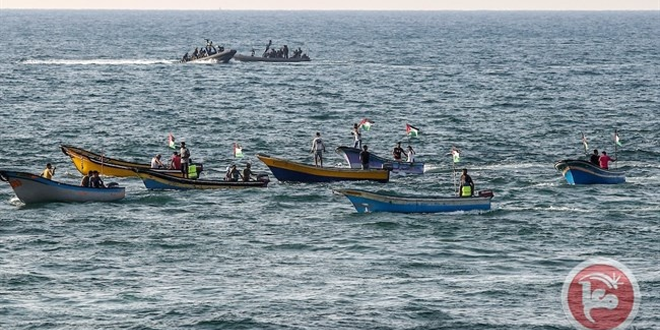Hundreds of Palestinian fishermen in the Gaza Strip are unemployed, as a result of the Israeli occupation preventing the marketing of what they catch in the West Bank which constitutes the most important market for selling fish in light of the sector’s weak purchasing power, high unemployment and poverty rates caused by the unjust siege imposed on it for more than one year.
In a statement to a SANA reporter, Head of the Palestinian Fishermen Union in the Gaza Strip, Nizar Ayyash, noted that the ban issued a few days ago constitutes a collective punishment against 4,500 Palestinians who work in the fishing profession in the Gaza Strip. The occupation’s determination of the permitted fishing area of a distance of no more than six miles along the 40 km long shore of the Gaza Strip is considered a new attack added to the daily ones pursued on fishermen by shooting at them, chasing them while they work, and depriving them of buying the parts needed to maintain their boats.
Ayyash pointed out that 60 tons of fish from the Gaza Strip were being marketed every month in the West Bank, and that this was not the first time that the occupation prevented marketing as it banned it last August for a month, which negatively affected the fishermen.
For his part, the coordinator of the Union of Fishermen’s Committees in the Gaza Strip, Zakaria Bakr, confirmed that the occupation, over the years of the siege, has been systematically and deliberately destroying the fishing sector. He indicated that preventing the marketing of fish in the West Bank deprives the fishermen of a basic source of income to meet the needs of their families, and to provide expenses in order to continue working at sea. Thus they become unable to ensure the wages of workers or the price of fuel needed to reach the fishing area in light of the global rise in fuel prices.
Bakr indicated that the fishing trip in the Strip is dangerous, and that since the beginning of this year, the occupation has attacked fishermen, resulting in the injury of 24 fishermen, the arrest of 59 others, the seizure of 22 fishing boats, and the sabotage and destruction of about 16 boats.
For his part, human rights researcher Hussein Hammad pointed out that the occupation’s decision to prevent the marketing of fish in the Gaza Strip comes at a time when Palestinian fishermen are facing great difficulties in accessing their only source of livelihood, as a result of the violations of the occupation forces. He indicated that the Israeli practices against fishermen constitute serious violations of human rights, especially the World Declaration of Human Rights and the International Covenant on Economic, Social and Cultural Rights.
Inas Abdulkareem

